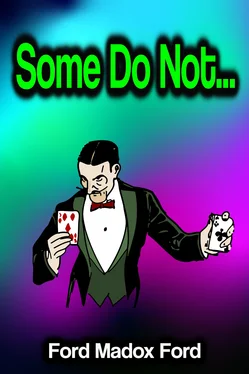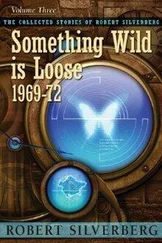The other four played on solemnly. The Father sat himself down behind Mrs Satterthwaite, his chin in the nape of her neck. At excruciating moments he gripped her shoulders, exclaimed: 'Play the queen , woman!' and breathed hard down her back. Mrs Satterthwaite would play the two of diamonds, and the Father, throwing himself back, would groan. She said over her shoulder:
'I want to talk to you to-night, Father,' took the last trick of the rubber, collected 17 marks 50 from the doctor and 8 marks from the unter-leutnant. The doctor exclaimed:
'You gan't dake that immense sum from us and then ko off. Now we shall pe ropped py Herr Payliss at gutt-throat.'
She drifted, all shadowy black silk, across the shadows of the dining-hall, dropping her winnings into her black satin vanity bag and attended by the priest. Outside the door, beneath the antlers of a royal stag, in an atmosphere of paraffin lamps and varnished pitch-pine, she said:
'Come up to my sitting-room. The prodigal's returned. Sylvia's here.'
The Father said:
'I thought I saw her out of the corner of my eye in the bus after dinner. She'll be going back to her husband. It's a poor world.'
'She's a wicked devil!' Mrs Satterthwaite said.
'I've known her myself since she was nine,' Father Consett said, 'and it's little I've seen in her to hold up to the commendation of my flock.' He added: 'But maybe I'm made unjust by the shock of it.'
They climbed the stairs slowly.
Mrs Satterthwaite sat herself on the edge of a cane chair. She said:
'Well!'
She wore a black hat like a cart-wheel and her dresses appeared always to consist of a great many squares of silk that might have been thrown on to her. Since she considered that her complexion, which was matt white, had gone slightly violet from twenty years of make-up, when she was not made-up--as she never was at Lobscheid--she wore bits of puce-coloured satin ribbon stuck here and there, partly to counteract the violet of her complexion, partly to show she was not in mourning. She was very tall and extremely emaciated; her dark eyes that had beneath them dark brown thumb-marks were very tired or very indifferent by turns.
Father Consett walked backwards and forwards, his hands behind his back, his head bent, over the not too well-polished floor. There were two candles, lit but dim, in imitation pewter nouvel art candlesticks, rather dingy; a sofa of cheap mahogany with red plush cushions and rests, a table covered with a cheap carpet, and an American roll-top desk that had thrown into it a great many papers in scrolls or flat. Mrs Satterthwaite was extremely indifferent to her surroundings, but she insisted on having a piece of furniture for her papers. She liked also to have a profusion of hot-house, not garden, flowers, but as there were none of these at Lobscheid she did without them. She insisted also, as a rule, on a comfortable chaise longue which she rarely, if ever, used; but the German Empire of those days did not contain a comfortable chair, so she did without it, lying down on her bed when she was really tired. The walls of the large room were completely covered with pictures of animals in death agonies: capercailzies giving up the ghost with gouts of scarlet blood on the snow; deer dying with their heads back and eyes glazing, gouts of red blood on their necks; foxes dying with scarlet blood on green grass. These pictures were frame to frame, representing sport, the hotel having been a former Grand Ducal hunting-box, freshened to suit the taste of the day with varnished pitch-pine, bath-rooms, verandahs, and excessively modern but noisy lavatory arrangements which had been put in for the delight of possible English guests.
Mrs Satterthwaite sat on the edge of her chair; she had always the air of being just about to go out somewhere or of having just come in and being on the point of going to take her things off. She said:
'There's been a telegram waiting for her all the afternoon. I knew she was coming.'
Father Consett said:
'I saw it in the rack myself. I misdoubted it.' He added: 'Oh dear, oh dear! After all we've talked about it; now it's come.'
Mrs Satterthwaite said:
'I've been a wicked woman myself as these things are measured; but...
Father Consett said:
'Ye have! It's no doubt from you she gets it, for your husband was a good man. But one wicked woman is enough for my contemplation at a time. I'm no St Anthony...The young man says he will take her back?'
'On conditions,' Mrs Satterthwaite said. 'He is coming here to have an interview.'
The priest said:
'Heaven knows, Mrs Satterthwaite, there are times when to a poor priest the rule of the Church as regards marriage seems bitter hard and he almost doubts her inscrutable wisdom. He doesn't mind you. But at times I wish that that young man would take what advantage--it's all there is!--that he can of being a Protestant and divorce Sylvia. For I tell you there are bitter things to see amongst my flock over there...' He made a vague gesture towards the infinite...'And bitter things I've seen, for the heart of man is a wicked place. But never a bitterer than this young man's lot.'
'As you say,' Mrs Satterthwaite said, 'my husband was a good man. I hated him, but that was as much my fault as his. More! And the only reason I don't wish Christopher to divorce Sylvia is that it would bring disgrace on my husband's name. At the same time, Father...'
The priest said:
'I've heard near enough.'
'There's this to be said for Sylvia,' Mrs Satterthwaite went on. 'There are times when a woman hates a man--as Sylvia hates her husband...I tell you I've walked behind a man's back and nearly screamed because of the desire to put my nails into the veins of his neck. It was a fascination. And it's worse with Sylvia. It's a natural antipathy.'
'Woman!' Father Consett fulminated, 'I've no patience wid ye! If the woman, as the Church directs, would have children by her husband and live decent, she would have no such feelings. It's unnatural living and unnatural practices that cause these complexes. Don't think I'm an ignoramus, priest if I am.'
Mrs Satterthwaite said:
'But Sylvia's had a child.'
Father Consett swung round like a man that has been shot at.
'Whose?' he asked, and he pointed a dirty finger at his interlocutress. 'It was that blackguard Drake's, wasn't it? I've long suspected that.'
'It was probably Drake's,' Mrs Satterthwaite said.
'Then,' the priest said, 'in the face of the pains of the hereafter how could you let that decent lad in the hotness of his sin...?'
'Indeed,' Mrs Satterthwaite said, 'I shiver sometimes when I think of it. Don't believe that I had anything to do with trepanning him. But I couldn't hinder it. Sylvia's my daughter, and dog doesn't eat dog.'
'There are times when it should,' Father Consett said contemptuously.
'You don't seriously,' Mrs Satterthwaite said, 'say that I, a mother, if an indifferent one, with my daughter appearing in trouble, as the kitchenmaids say, by a married man--that I should step in and stop a marriage that was a Godsend...'
'Don't,' the priest said, 'introduce the sacred name into an affair of Piccadilly bad girls...' He stopped. 'Heaven help me,' he said again, 'don't ask me to answer the question of what you should or shouldn't have done. You know I loved your husband like a brother, and you know I've loved you and Sylvia ever since she was tiny. And I thank God that I am not your spiritual adviser, but only your friend in God. For if I had to answer your question I could answer it only in one way.' He broke off to ask: 'Where is that woman?'
Mrs Satterthwaite called:
'Sylvia! Sylvia! Come here!'
A door in the shadows opened and light shone from another room behind a tall figure leaning one hand on the handle of the door. A very deep voice said:
Читать дальше












